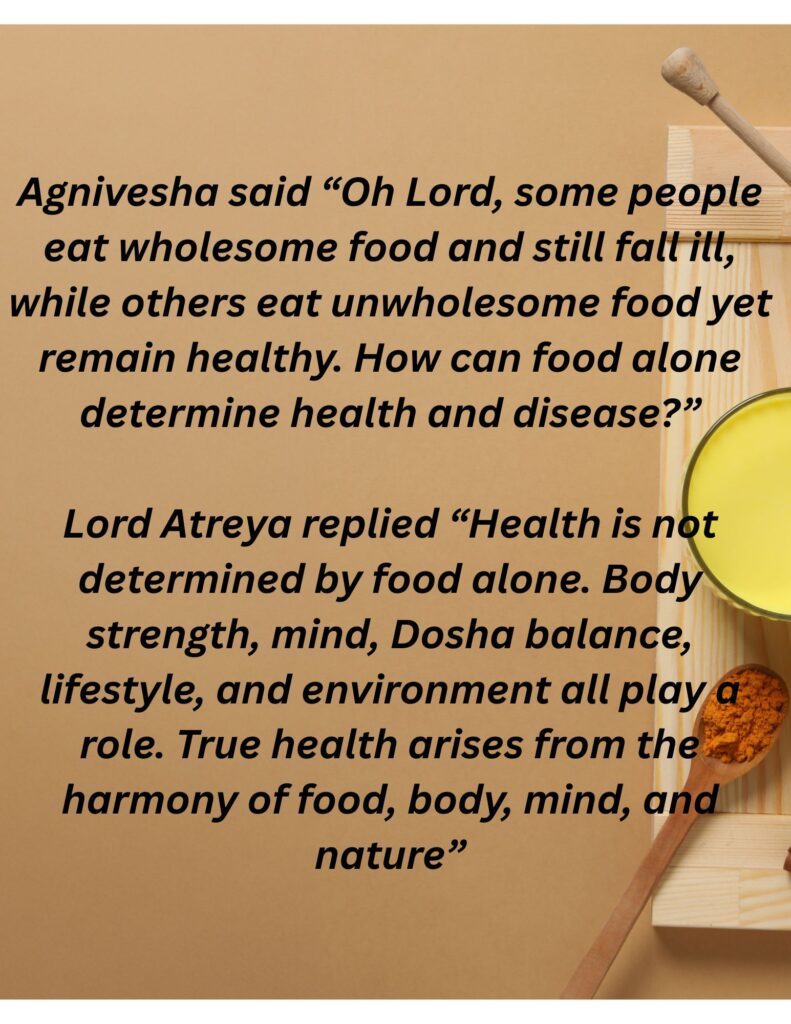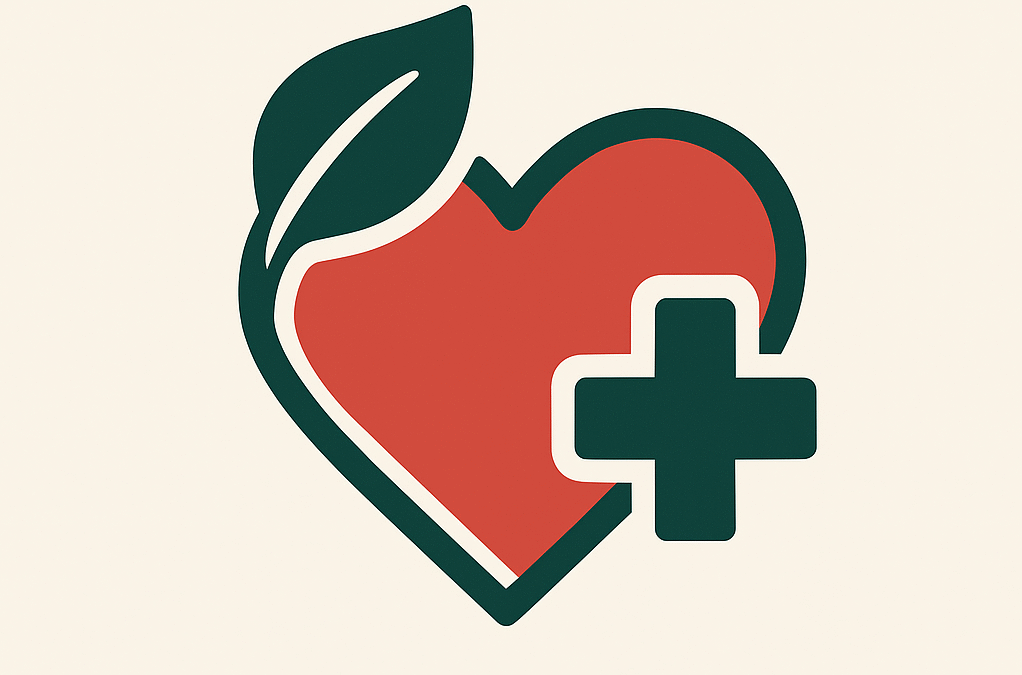From the treasure of Ayurveda to your screens.
Introduction
Immunity has been a hot topic over the past few years. When COVID hit, we all became more conscious about keeping ourselves and our loved ones safe.
But what exactly is immunity? Simply put, it’s our body’s defense system. Different cells, organs, and molecules work together to protect us from infections and keep us healthy.

Does Ayurveda mention immunity?
Yes, it does, and in great detail.
However, the concept isn’t a direct Sanskrit translation of modern-day “immunity.” The underlying idea is the same: the body’s ability to prevent and resist disease.
In Ayurveda, immunity is often correlated with Vyadhikshamatva, which literally means resistance to disease. It reflects the body’s capacity to fight illness, maintain balance, and sustain health.
Observe this dialogue between a student and his teacher:
(Charaka Sutra Sthana 28/7)

This ancient insight aligns closely with the modern understanding of immunity. Just as Atreya explained, a person’s ability to resist disease depends not only on what they eat, but also on their physical strength, mental resilience, balance of bodily energies, and lifestyle habits—essentially what Ayurveda refers to as Ojas, the vital essence that sustains immunity and vitality.
Vyadhikshamatva- Your Very Own Natural Defense
In Ayurveda, the term Vyadhikshamatva refers to the body’s ability to resist and fight disease. It is not just “immunity” in the western sense, but a broader capacity to maintain health.

Classical texts describe it as having two parts:
- Vyadhi-utpada pratibandhakatvam – the ability to prevent the onset of disease.
- Vyadhi bala virodhitvam – the ability to fight back when a disease has already appeared.
This shows that Ayurveda recognizes both preventive and defensive immunity very clearly.
In fact, the primary goal of Ayurveda is to preserve the health of the healthy and to cure the disease of the sick. (Ch. Su. 30/26)

Ojas- The essence of Vitality
Ojas literally means strength and luster.
Ayurveda considers it the essence of the seven bodily tissues, and some texts describe it as a by-product of Shukra (the reproductive component). It is stored in the reproductive cells of the parents in a dormant form. On conception, Ojas becomes the first building block of the developing embryo, nourishing it through gestation.
After birth, Ojas continues to form through the metabolism of all bodily tissues, remaining the purest, most vital essence. This subtle life force fuels our immunity, vitality, and overall resilience.
It is known to play a dual role by protecting against diseases and also aiding recovery. Classics of Ayurveda define Ojas beautifully in terms of quality and quantity. It is believed that those listed qualities and quantity significantly influence an individual’s overall resilience.
Strengthening Ojas is essentially strengthening our body’s natural defense system.
How Ojas and Vyadhikshmatava Work Together?
In Ayurveda, Ojas and Vyadhikshamatva are deeply connected. Think of Ojas as the energy and essence that sustains life, while Vyadhikshamatva is the body’s ability to resist and fight disease.
When Ojas is strong, it nourishes the tissues, stabilizes the mind, and maintains balance in the body. This, in turn, enhances Vyadhikshamatva, giving the body the power to prevent illness and recover faster when disease occurs.
Conversely, depleted Ojas weakens Vyadhikshamatva, making the body more susceptible to infections, stress, and fatigue. In simple terms, Ojas is the fuel, and Vyadhikshamatva is the shield. Together, they form the foundation of a resilient, healthy body and mind.
Ojas is the fuel that powers Vyadhikshamatva
Are immunity and Vyadhikshmatava synonymous?
Both immunity and Vyadhikshamatava are known to protect our body from diseases. So, can we say that they are synonyms?
Well. Not exactly. Here’s why.
Let’s explore the concept of immunity a little.
Immunity, as you know, is our body’s natural defense against a host of pathogenic microbes. It is not a one-step process but a series of well-orchestrated events that begin the moment your body senses potential pathogen.
The immune system works through a cascade of cellular and metabolic functions, and here’s the cool part, it REMEMBERS. Unlike your beau who again forgot your anniversary, your immune system never forgets its past encounters!
This “memory” is crucial. It helps the body recognize and respond faster to offenders it has already met before. In fact, this very principle forms the foundation of modern immunization. By introducing a tiny, harmless dose of a pathogen (either dead or weakened), the body treats it as a war drill. It then creates memory cells, soldiers that remember the enemy. So, if the real pathogen ever attacks, your immune system already has the weapons ready to win the war.
Immunity ≠ Vyadhikshamatava
Now, here’s where Vyadhikshamatva adds a unique dimension. While immunity explains the biological mechanism of defense, Vyadhikshamatva is a broader Ayurvedic concept. It includes not only this defensive capacity but also an individual’s vitality, Ojas, Agni, and overall ability to resist and recover from disease. In other words, immunity is a mechanism, but Vyadhikshamatva is resilience.
Their scope also differs. Immunity is primarily physiological and cellular. Vyadhikshamatva is holistic—it embraces physical, mental, and even spiritual resistance. Modern science points to genetic factors, nutrition, microbiome, and prior exposure to pathogens as determinants of immunity. Ayurveda, on the other hand, roots Vyadhikshamatva in Prakriti (constitution), Agni (digestive fire), Ojas (vital essence), Bala (strength), Satmya (adaptation), Ahara (diet), Vihara (lifestyle), and Manas (mind).
So, while immunity is one important aspect of Vyadhikshamatva, the latter is much more expansive. Vyadhikshamatva is not just about fighting microbes—it is about sustaining health, balance, and resilience at every level.
Immunity is one part of Vyadhikshamatva, but Vyadhikshamatva is more than just immunity.
So can you acquire more Ojas?
Yes — cent percent.
Ayurvedic classics mention the word Bala as a practical term to describe the functional expression of Ojas, the essence that sustains life and immunity. Just as modern science talks about immunity, Ayurveda explains Bala in three forms:
- Prakrita Bala – the natural strength you are born with (comparable to innate immunity).
- Kalaja Bala – the variation of strength according to time, age, or seasons (for example, people may feel stronger in certain seasons and weaker or more prone to illness in others).
- Yuktikrita Bala – the acquired strength developed through proper diet, lifestyle, medicines, and strategies (similar to building acquired immunity).
Thus, Ayurveda clearly emphasizes that while some aspects of Ojas or Bala are inborn, we can also consciously enhance and protect it through right choices.

Time-Tested Lifestyle Habits for Ojas and Lasting Immunity
1. Nidra (Adequate sleep)- Rest you way to stronger immunity
Sleep is a cornerstone of health and well-being. Along with Āhāra (diet) and Brahmacharya (regulated lifestyle), Ayurveda regards Nidra (sleep) as one of the three fundamental pillars of health.
Adequate rest each night allows the body to repair tissues, restore energy, and maintain cognitive balance.
But how much sleep is “enough”? It is actually subjective. While some may feel refreshed with 6 hours, others may require up to 9 hours. The key is to listen to your body’s needs and respect its natural rhythms.

2. Ahara (Right diet)- Food is the Greatest Medicine
It’s a no-brainer that food is essential to sustain life. In Ayurveda, food is even described as Mahābhaiṣajya , the greatest medicine. But does this mean any kind of food will do? Not quite. Just like medicine, the right food depends on several factors such as your age, gender, level of physical activity, the season, and even the time of day.
Still, some universal principles remain. Always prefer warm, freshly prepared meals over stale or processed ones.
Ayurvedic texts also describe Sarvakalika Hita Ahara, foods that are considered wholesome at all times, irrespective of season or constitution. These include milk, cooked rice, ghrita (clarified butter) and clean water.
3. Dinacharya (daily conduct)- Aligning with Nature’s Rhythm
It is often said, “How you live your day today defines your tomorrow.”
This holds especially true in Ayurveda. It emphasizes small yet profound daily habits that keep the body strong and the mind at peace.
Central to this philosophy is aligning with the natural rhythm of life. This is known today as the circadian rhythm. By living in harmony with these cycles, we support both our physical vitality and mental clarity.
Simple practices such as waking up early, practicing oil pulling, exercising daily, and eating mindfully in tune with the body’s natural rhythm may seem small, but together, they create a powerful foundation for lifelong health and resilience.
4. Ritucharya (seasonal care)- Staying Balanced through the Seasons
Our Earth revolves around the Sun, giving rise to the seasons we experience. In India, six distinct seasons are observed, while in other parts of the world the number may differ. You may have noticed how your body’s needs change with every season. But is adapting to seasonal change only about switching on the heater in winter and the AC in summer?
Ayurveda answers this beautifully through the principle “Yat Pinde Tat Brahmande” whatever exists in the universe also exists within us.
This means that as the environment changes, subtle changes also occur within our body. To stay balanced, we must care for ourselves in tune with nature’s rhythm.
With winter approaching, it’s the perfect time to explore Ritucharya ,Ayurveda’s seasonal regimen, to learn simple lifestyle adjustments and dietary tips that keep you healthy, resilient, and energized throughout the cold months.
5. Manasika Shanti ( mental peace)- Stress less, Strengthen Ojas
Mental balance is as vital as physical strength for immunity.
As Kabir said, ‘If you lose in your mind, you are defeated; if you win in your mind, you are victorious.’

Ayurveda describes the mind deeply linked with Ojas, the essence of vitality and immunity. Chronic stress, fear, and negativity deplete Ojas, making the body vulnerable. On the other hand, calmness, positivity, and resilience nourish it. Modern science echoes this wisdom. Chronic stress has been linked to weakened immune defenses over time. A systematic review, analysing clinical trials on mindfulness meditation and immune function, from 1965 to 2015, concluded that mindfulness meditation shows potential benefits for inflammation, cell-mediated immunity, and biological aging.
6. Rasayana (rejuvenation therapies)-Nourishing the Body’s Core
Labhopayo hi śastānām rasādīnām rasāyanam” (Charaka Chikitsa 1)
Rasayana refers to therapies that nourish and strengthen the Rasadi Dhatus (seven body tissues). The refined essence of these tissues is Ojas, the basis of vitality and immunity. However, for Rasayana to act effectively, a healthy and balanced Agni (digestive-metabolic fire) is essential.
With the periodic use of Rasayana herbs like Ashwagandha, Amalaki, Guduchi, Shatavari, or formulations like Chyawanprash, under proper guidance, the quality of Dhatus is enhanced eventually culminating in the promotion of Ojas and robust immunity. This helps in promoting Yuktikrita Bala.
7. Sadachara ( good moral conduct)-The Forgotten Key to Health and Longevity
Ayurveda greatly focuses on a holistic approach. Tackling diseases or preventing them, always has a mental and social component. Principles like Sadavṛtta and Āchāra Rasāyana guide us all to be righteous, honest, peaceful, truthful, and disciplined in self-control.

By cultivating such values, one not only maintains harmony at the level of mind and society but also experiences tangible health benefits such as enhanced immunity, better adaptability to stress, and delayed ageing. Classical texts emphasize that a person who follows virtuous conduct, even without consuming pharmacological Rasāyana, attains Rasāyana-like effects. Hence, moral conduct in Ayurveda is not merely ethical instruction but a powerful preventive and promotive health measure.
To conclude:
Immunity can be strengthened through simple yet consistent measures, eating the right foods at the right time, ensuring adequate sleep, and maintaining emotional balance. These practices, supported by the timeless principles of Ayurveda, create the foundation for strong and lasting health. As the classical texts wisely remind us:
Above all, safeguard your body ,for without it, nothing else can exist.(Charaka Nidana 6)

Caring for the body, mind, and spirit together is thus the truest way to preserve immunity and overall well-being.

One Comment